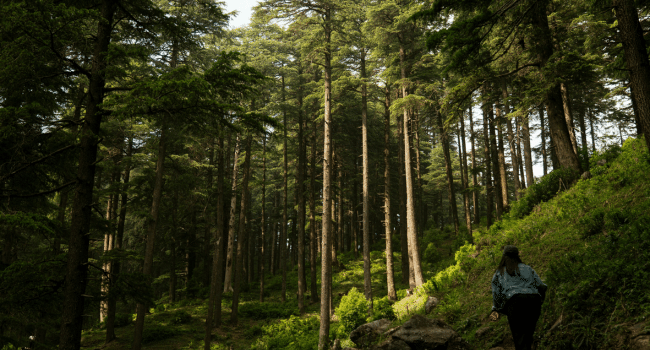Table of Contents
A jungle is not just a place; it’s a living world with rules, rhythms, and silent conversations we can never fully understand. For many of us, stepping into a forest—whether on a safari or a walking trail—is a privilege and a thrill. Hearing a distant alarm call, spotting a kingfisher by a stream, or watching a deer graze in golden light is enough to bring you goosebumps.
But with this beauty comes responsibility.
The wild is fragile, and every visitor plays a role in either protecting it or disturbing it. Jungle ethics aren’t written on signboards—they come from respect, patience, silence, and understanding that we are guests in someone else’s home.
If you love exploring the wild and want to travel in a way that honors nature, here are some important ethics to follow on your next jungle adventure.
For more real wildlife experiences, nature stories, and photography moments from India’s forests, you can explore Jungle Revives —
1. The Jungle Is a Home — Treat It Like One
When you enter the forest, you’re stepping into the home of tigers, elephants, birds, reptiles, insects, and countless unseen species. They aren’t visitors. We are.
That shifts the mindset immediately.
Avoid loud voices, sudden movements, or behaving like you are in a theme park. The quieter you are, the more the jungle reveals itself. Animals behave naturally when you show respect and patience.
Silence isn’t just polite—it’s powerful in the forest.
2. Don’t Feed Animals — Ever
It’s tempting to offer food to a monkey, deer, or bird. But feeding animals changes their behavior permanently:
- They lose fear of humans
- They might start depending on handouts
- It creates conflict and aggressive behavior
- It’s dangerous for their health
Wildlife must stay wild. Once an animal starts associating humans with food, its natural survival instincts weaken.
The real gift you give them? Letting them remain independent.
3. Wildlife Photography Without Disturbance
We all love taking pictures. But ethics come before the perfect shot.
Avoid:
- Blocking animal paths
- Chasing animals with a vehicle
- Flash photography at night
- Calling or whistling to attract wildlife
The moment you influence their behavior, it’s no longer ethical or natural photography.
Great wildlife photographers don’t just take pictures—they tell real stories without interrupting nature.
4. Respect Distance — Zoom Lenses Exist for a Reason
Whether you see a tiger crossing, elephants eating, or birds nesting, never get too close. The rule is simple:
If the animal reacts to your presence, you’re too close.
Distance isn’t about missing out. It’s about safety—yours and theirs. A respectful distance keeps animals calm and prevents accidents.
Remember, in the jungle, they have right of way. Always.
5. Carry What’s Necessary — Leave Zero Trace
Plastic bottles, snack wrappers, tissues, and food packets have no place in the forest. A single plastic bit can remain in nature longer than your lifetime.
Carry reusable bottles and biodegradable items when possible.
Here’s a complete checklist to help you pack ethically and efficiently before entering any forest:
Whatever you bring to the jungle, take it back with you. Take only memories (and photos!), leave only footprints.
6. Respect Safari Rules & Guides
Forest guides and drivers know the jungle better than anyone. They understand animal behavior, danger signs, and safe distances.
If they ask you to sit, be quiet, or stay still—listen.
Breaking rules for a selfie or sighting isn’t bravery; it’s ignorance that risks lives. Yours, theirs, and wildlife’s.
The jungle isn’t a place for ego—it’s a place for humility.
7. No Music, No Honking, No Noise
Nature has its own soundtrack: bird calls, rustling grass, river sounds, alarm calls. Trust me, nothing compares to it.
Bringing speakers, playing music in jeeps, clapping to attract animals—these things ruin the jungle for everyone.
Silence is what allows the jungle to speak.
8. Patience Is More Rewarding Than Excitement True jungle lovers know this:
Sometimes you wait hours and see nothing.
Sometimes one minute creates a lifetime memory.
The wild is unpredictable. And that’s the beauty of it. Chasing sightings, yelling for speed, or getting angry if you “don’t see anything” means you missed the point.
Wildlife isn’t performing for us.
Being there itself is a blessing.
9. Do Not Light Fires or Smoke
A single spark can do irreversible harm. Forest fires destroy habitats, nests, and wildlife corridors. Even cigarette ash can trigger disaster in dry seasons.
Fire belongs to campsites—not jungles.
10. Support Responsible Tourism
Choose eco-friendly stays, ethical safari operators, and destinations that prioritize conservation. When communities benefit from protecting wildlife, the forest survives.
Your travel choices matter.
If you enjoy the wild today, someone protected it yesterday.
11. Stay on Trails — Don’t Wander Off
Walking into restricted zones, stepping off paths, or entering grasslands may disturb nesting birds or resting animals. In the wild, there are invisible territories and animal routines we don’t understand.
Stick to marked trails. They exist for a reason.
12. Never Tease or Provoke Animals
No mock noises.
No stone throwing.
No flashing lights.
No banging on jeep rails.
If you wouldn’t do it to a guest in your house, don’t do it to a wild resident in theirs. Animals aren’t entertainment—they’re living beings sharing space with us.
Final Thoughts: Respect Gives Real Experiences
The jungle gives back exactly what you offer it:
- Respect → Magic
- Patience → Sightings
- Silence → Secrets
- Humility → Connection
The more gentle you are, the more you will see.
The more still you are, the more the forest speaks.
The more respect you show, the more the jungle opens to you.
Real jungle lovers know —
the sighting is a bonus; being in the wild is the gift.
For more nature stories, safari tips, and real wildlife experiences, visit:
Let’s protect the forests that give us peace, thrill, and unforgettable moments. The wild belongs to itself — we are only guests passing through.
